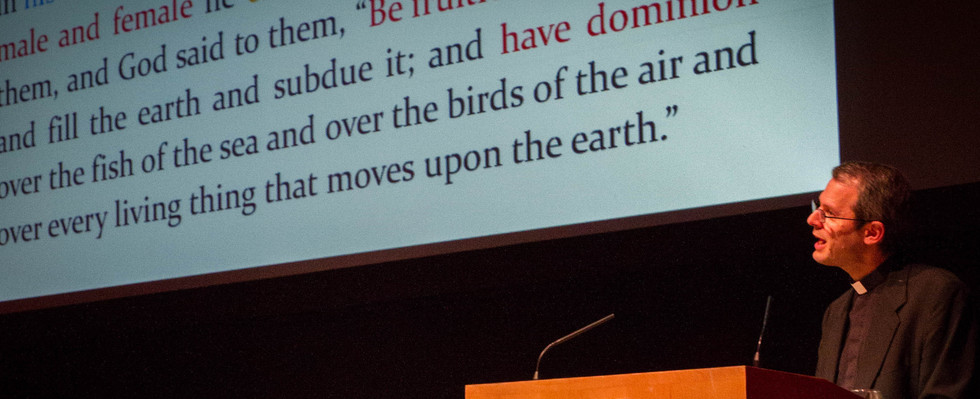Faith Summer Session 2014: A Review
“Thank God that He has permitted us to live among the present problems. It is no longer permitted to anyone to be mediocre,” Dorothy Day, Servant of God
In early August 2014, several hundred young Catholics from across the British Isles gathered for five days at The Woldingham School in Surrey. They came together to attend the Faith Movement’s 42nd Annual Summer Session. From modest beginnings, this event has now grown into a major annual conference for young adults. Their number includes an ever burgeoning cohort of seminarians, priests and religious. The overwhelming majority, however, are young lay Catholics.
The week provides them with a balance of social, spiritual and even sporting activities. What primarily seems to attract young people in ever greater numbers, however, is a contemporary presentation of the orthodox Catholic faith compatible with reason and modern science. “Faith is unbelievably good at giving you the bigger picture – starting with why belief in God is reasonable in a scientific age – so that both your mind and then your heart ends up falling in love with Jesus Christ,” said one young seminarian who attributes the discernment of his priestly vocation to the movement.
“The married family is, indeed, society’s first, best and cheapest department of health, welfare and education.”
If it is true that Jesus Christ is the culmination, the crowning point of God’s plan for the universe, then it follows that the universe is incomplete without Him; “God had set forth in Christ a plan to recapitulate all things in Christ, a plan for the fullness of time,” proposed Saint Paul to the Ephesians (1:9-10). This means that no branch of knowledge and no person can be complete without Jesus Christ, “All things were created through and for Him… and in Him all things hold together,” (Colossians 1:16-17). Christ then is the master key that unlocks the meaning of the universe and of every human life. It is in Him that “we live and move and have our being” (Acts 17:28). It is within this divine economy, this supernatural eco-system that we humans find our greatest reason to be and our most abundant source of grace, permitting us to grow and flourish.
This loving plan of God includes marriage and the family. That was the theme of the 2014 Faith Summer Session; “For this reason I kneel before the Father, from whom every family in heaven and on earth derives its name,” (Ephesians 3:14-17).
For those of us in the West, the breakdown of the family is nothing new. We are now several generations into a grand pan-societal experiment that seeks to eviscerate a traditional understanding of marriage and family from our law and culture. So far, the biggest losers have been the young.
Over the past forty years, voluminous sociological studies have repeatedly reached the same stark conclusion: children overwhelmingly do best in life when they grow up with a mum and a dad who are married. The married family is, indeed, society’s first, best and cheapest department of health, welfare and education.
For numerous reasons, this ideal is not always possible to achieve in reality. Life doesn’t always conform to our plans. Bad things can happen. Tragic things do happen. In such cases we should be quick as a society to offer both sympathy and support in equal measure to those affected. We should also applaud the many parents and families who achieve remarkable things in the most difficult of circumstances.
There is no tension, however, between a compassionate recognition of reality and a measured propagation of an ideal. This is exactly what we do as a society in many other areas of public policy, from smoking cessation to healthy eating. As regards marriage and the family, however, the dogma of our cultural elites is that the traditional ideal is no longer, well, ideal. That it is – at best – merely one lifestyle choice amongst many of equal worth to society or – at worst – a poisonous patriarchal relic of a less socially enlightened age. This is the intellectual milieu within which our young people are growing up.
Next month will see bishops from around the globe gather in Rome to discuss these very issues. Next year will likely see His Holiness Pope Francis make his first visit to the United States in support of the World Meeting of Families, hosted by the Archdiocese of Philadelphia. The future of humanity passes by way of the family.
This edition of Faith Magazine hopes to contribute in a constructive, compassionate and intelligent way to those forthcoming discussions. We firmly reject any temptation to be reactionary. Reactionism will only ever attract the old and the angry. As Pope Francis reminds us in his apostolic exhortation, Evangelii Gaudium, “with Christ joy is constantly born anew.” The Catholic vision of marriage and the family is, indeed, a joyful one. It is also very beautiful, entirely liveable and increasingly necessary.
In the following pages we therefore present some of the talks that seemed to most engage and enthral those young people who gathered in Woldingham last month. Our hope is that each article can contribute, by whatever measure, towards a New Evangelisation and, in turn, a Civilisation of Love. In the words of the founder of the Faith Movement, Father Edward Holloway:
“The only reward of life is that men and women think they have reason to love you, that through all your faults, the seed of God’s image yet lives in you, and you are, God help you, lovable, worthy to be loved. Life has no other reward, you take nothing else beyond the grave. For this is the reward of faithful love, a love which shares with Christ all the burden of creation, from conception to salvation, from the cradle to the grave. This then is Christian married love, and so we should teach it.”


